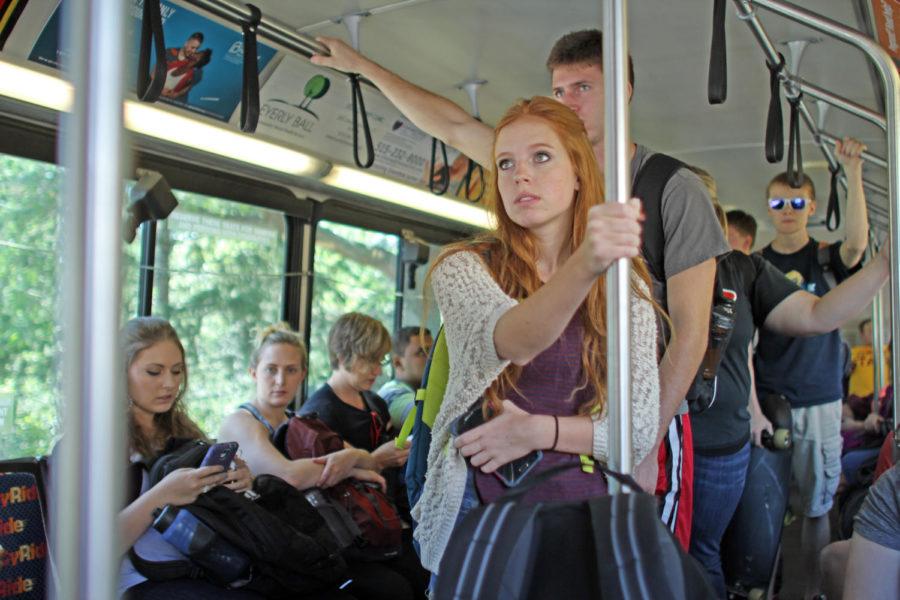A bumpy road ahead: CyRide struggles with capacity, finances
CyRide has had increased ridership and is having issues accommodating the number of students that are boarding their buses.
September 3, 2014
Increased enrollment and decreased revenue have conspired to force CyRide to look to the city of Ames, Iowa State and the Government of the Student Body for budget solutions.
The shortfall is due to a change in federal law declaring how money for public transportation is allocated.
“The earmarks are now gone,” said Sheri Kyras, transit director for city of Ames. “We have a new transportation bill that does not have any discretionary money for us.”
CyRide received around $4 million in federal operating assistance between the 2013 and 2014 fiscal years, Kyras said. The funding was governed by the Safe, Accountable, Flexible, Transportation Equity Act.
The act was signed into law in 2005 and provided funds for public ground transportation until Congress replaced the law in 2012. The current law, Moving Ahead for Progress in the 21st Century Act, has essentially phased out CyRide’s federal funding.
Although MAP-21 expires at the end of December, Kyras does not see funding procedures changing anytime soon. The previous legislation was extended by Congress 10 times before it was replaced.
“I’m assuming there will be another extention of MAP-21 [in December],” Kyras said.
In 2013, CyRide received $3.49 million from GSB and $1.45 from a tax levy on the city of Ames. Kyras said the Ames Transit Board reviews the CyRide budget each fall.
“We give them the current level of service [cost] at next year’s prices,” Kyras said. “We give them options to make the system better, then they decide which scenario they want to fund.”
The Ames Transit Board also met with representatives from Iowa State and the GSB on Aug. 4 to discuss the problem.
“We’re working with those representatives to discuss creative solutions,” said Hillary Kletscher, president of GSB. “There is some conversation about bus routes, the number of buses and about future expansion.”
Official proposals have not yet been made by Iowa State, GSB or the transit board, but Kletscher is recommending a student fee increase to keep up with demand for service.
“Not by a substantial amount, but really more for an inflationary amount,” she said.
The swelling concern is also attributed to the growing demand for CyRide services due to a larger student body. Iowa State is expected to announce enrollment has climbed to over 34,000 students when the official numbers are released next week.
“At a time when federal dollars are being cut back, our ridership had grown dramatically,” Kyras said. “We saw a 12.3 percent increase last year alone.”
The 12 percent increase represents 725,000 more rides provided in 2013 than the previous year. Kyras expects an increase of 250,00 to 300,000 more rides in 2014.
CyRide has made efforts this year to deal with the demand and to combat overcrowded or delayed service. Ten used buses were purchased this year from the St. Paul, Minn., transit system this year, but only eight will be added to the fleet. The other two are being “cannibalized for parts,” Kyras said. Four of the buses are currently operational with a fifth scheduled to come online next week.
According to CyrRide’s website, the current fleet consists of 93 buses, 4 administration vehicles and two trucks.
“Our plan is to purchase five to ten used buses every year to expand and to replace vehicles as we have to,” she said.
CyRide is also continuing to look for qualified operators even though 35 new drivers were hired over the summer.
“Our drivers are having to put in a lot of overtime right now just to keep the system going,” Kyras said.
Ten service-hours per week have also been added and more buses have been allocated to the busiest routes, but students have noticed buses are still crowded.
Matt Mason, junior in kinesiology and health, said he rides the buses to and from school everyday.
“They’re pretty full,” Mason said. “If the prices go up drastically, then I’d be pretty upset.”
Kletscher echoed Mason’s sentiment about overcrowding on the buses.
“I think [the overcrowding] is something that any student could attest to simply by walking around campus,” Kletscher said.
All parties said they must work together to provide the best service, but it may be a long process.
“We are having those conversations together,” Kletcher said. “But the progress is sometimes slow because the investment that needs to be made is so large. Coming to a consensus and finding a solution is a process that takes some time.”







